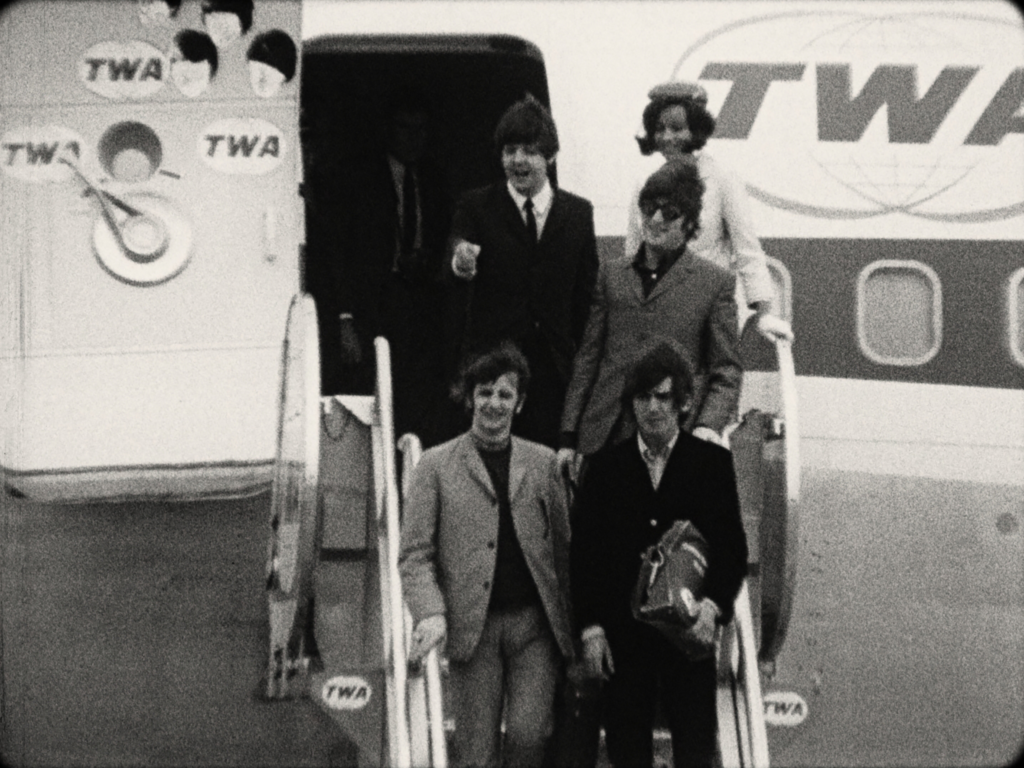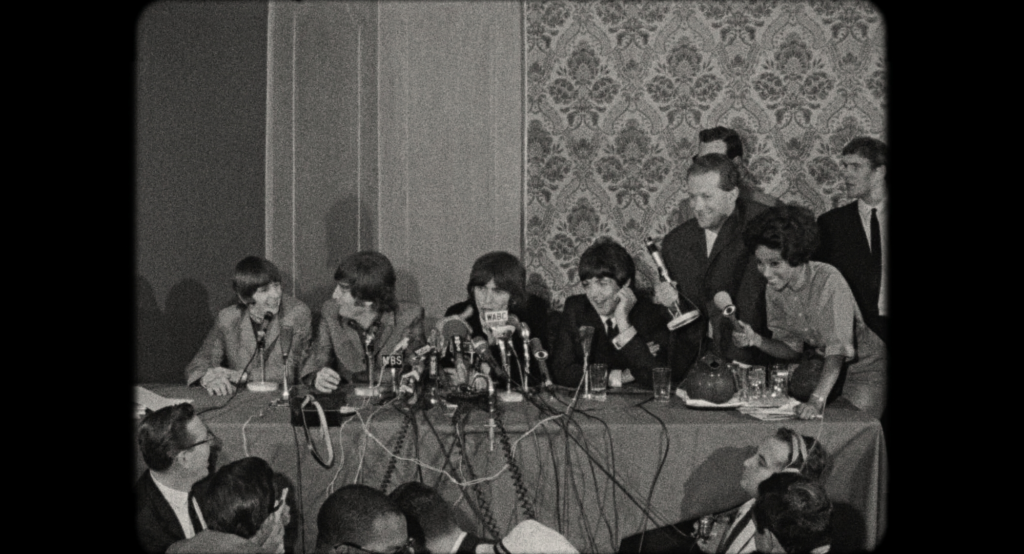Director: Andrei Ujică
Writer: Andrei Ujică
Stars: Tommy McCabe, Shea Grant, Thérèse Azzara
Synopsis: August 1965, The Beatles arrive in New York for a sold-out Shea Stadium concert. Crowds of frenzied fans fill Manhattan streets, hoping to catch sight of the band from their hotel.
Andrei Ujică constructs his latest documentary, TWST / Things We Said Today (screening Out of Competition in this year’s Venice Film Festival), using conventional and unconventional means to build a cinematic poem. Monochrome archive footage is experimented with as apparitions and drawings of people are placed in it. The old is blended with the new; the gift and curse of technology have made it possible for Ujică to create a project he has wished to create for a while. What is the poem about, you might ask. A time long gone, whose ripples continue to have their effects today in a variety of means. The time the Romanian documentary filmmaker, or more so the people who have borne these memories, is the 1960s America, a period of significant change both in the arts and politically.

There were many countercultural and civil rights movements, anti-war protests, generational gaps, the construction and deconstruction of folk music, and the birth of The New Hollywood, better known as the Hollywood Renaissance. At that time, the country constantly changed; nobody knew where things were headed. You can say that with each passing decade. But the 1960s were a salient time known for the uniform shaping of society, art, and everything in between. Ujică depicts this through footage of rural life in New York City from August 13th to 15th, 1965–from the arrival of The Beatles in the Big Apple to their concert in Shea Stadium, their first stadium show in America.
TWST is a wistful poem titled after the band’s track of the same name from their popular record ‘A Hard Day’s Night’. It borrows some of the thematic elements that the song has, although Ujică follows a more spiritual path to reflect the intertwining between nostalgia and dreams. At first, you don’t notice any correlation between The Beatles’ record and the director’s film. The Fab Four have a couple of appearances in the first couple of minutes, and their presence is felt through the footage that the unsung documentary filmmaker is showing us. In each second, whether relating to the New York World’s Fair or the Watt Riots reports seen on television, you get the feeling that they are guests in that sleepless city.
The manic, overly joyous fans are also a great cause of this sensation, with their excitement on their arrival slowly spreading through New York like sunshine after a few days of rain. However, the moment when Ujică starts to tie TWST with the titular track through the poem dictated, everything starts to blend together in an intriguing and occasionally flimsy fashion. None of the lines from the song are said, but its structure is used to mold this documentary. “Things We Said Today” was a song about nostalgia. Paul McCartney was reminiscing about the present by projecting an idea of the future. Many fans have speculated that he wrote it with a nostalgic tone in mind because Paul knew that his relationship with then-girlfriend Jane Asher would not last, at least with their lifestyles.
In Barry Miles’s book “Many Years From Now,” McCartney describes this sensation as “future nostalgia,” a term pop artist Dua Lipa later coined for her sophomore record. The first taste of the connection between TWST and “Things We Said Today” comes from the assimilation of the love McCartney had for Asher, as said in lines like “And though we may be blind, love is here to stay, and that’s enough”, with the recollections of a time the narrator holds onto sincerely. This bridge refers to McCartney’s enchantment when stumbling upon love and its various forms. Ujică takes advantage of this by initially showing footage of the Beatlemania-riddled fans saying the many reasons why they love them and their favorite member, later transitioning to a stanza about the power someone’s love has over a person.
Unlike an unnecessary Hollywood legacy sequel, TWST does not use nostalgia as its main attraction. There is a bit of “homesickness” about how life was back then and that special moment that unified thousands during that three-day strand. It only contrasts “Things We Said Today” and the poem. The connection between lyric and verse may occasionally be an arbitrary choice. This makes the documentary suffer from a distancing aimlessness that undermines its narrative cohesion. I get that Ujică wants to immerse us in this setting by showing footage of people wandering through New York doing their daily activities until the festivities arrive. Yet, it dilutes the documentary’s emotional impact a notch. Well, that is until the last few minutes.

The viewer is challenged to interpret the fluid interplay between form and content more psychologically to see how we respond to our own present-day nostalgia. McCartney’s final lyrics are: “Someday when we’re dreaming, deep in love, not a lot to say; then we will remember things we said today.” And like so, TWST ends on a touching note. As fans come together to sing the Beatles’ tunes, a liberation of nostalgia and fulfillment spreads across Shea Stadium. This is represented by the butterflies enclosing and popping out of their chrysalis cases. It is like a transformation of the narrator’s remembrance. And the resulting image is striking; that alone makes the documentary worth watching.





